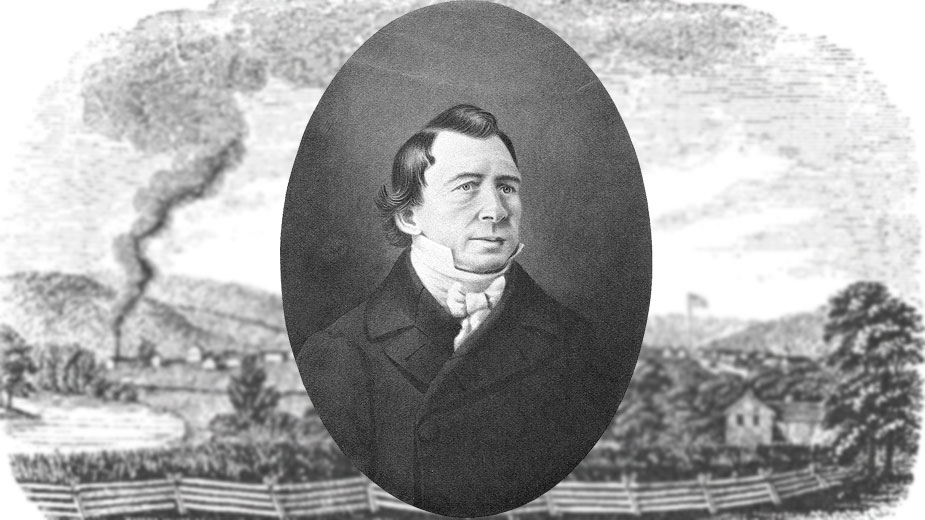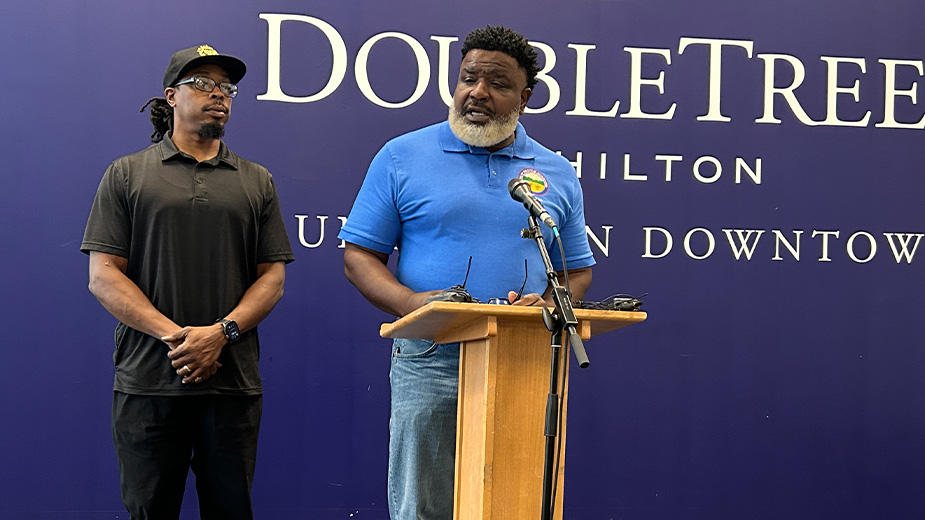Flashback: The Impeachment of George Tod
YOUNGSTOWN, Ohio – There was little political drama during the Feb. 12, 1805 session of the Ohio General Assembly surrounding the passage of an unassuming bill titled “An Act Defining the Duties of Justices of the Peace and Constables in Civil and Criminal Cases.”
But the firestorm unleashed from this otherwise innocuous law laid bare a power struggle that had erupted across the newly admitted state – and culminated in the impeachment of one of the most influential men in the Mahoning Valley.
George Tod was the patriarch of one of the most prominent families of Youngstown whose name and legacy resonates throughout the region to this day. Born in Suffield, Conn., in 1773, he was graduated from Yale University, studied law at Litchfield Law School and was admitted to the bar of what was then the Northwest Territory at Marietta, Ohio, in 1800.
He moved his family to this region the following year and settled in Youngstown, where he was appointed prosecuting attorney for Trumbull County (Mahoning County had yet to be established).
It was clear from the start that Tod harbored higher political ambitions – and there was no better place to pursue these opportunities than the frontier. He had emerged as part of a conservative wing of the Democratic-Republicans, a political faction that supported Thomas Jefferson and was formed during the Early Republic era to counter the influence of the Federalist Party and its supporters, such as Alexander Hamilton.
Jefferson saw the West – in particular the Ohio region – not only as an opportunity to expand the commercial and agricultural interests of the young nation, but also as a means to establish a constituency that would further his own political legacy.
When Jefferson won the presidential election of 1800, the nature of politics in the Northwest Territory also changed and Tod threw himself into the mix.
Simultaneously, a more liberal branch of the Democratic-Republicans began to assert its influence across the territory. Led by Thomas Worthington, then a legislator in the territorial government, the group lobbied aggressively for Ohio statehood while also maneuvering to purge the region of any Federalist influence.
Their first target was Northwest Territory Gov. Arthur St. Clair, a former general who served under Washington and an ardent Federalist.
In January of 1802, Worthington wrote to Jefferson calling for St. Clair’s removal, charging that the governor had abused his office and “is an open and avowed enemy to a republican form of government and an advocate of monarchy.”
St. Clair responded with a letter in his defense to the president, complaining that the Worthington faction “was endeavoring to ruin me with you, and boast that my removal is decided on.”
Tod had a cordial relationship with St. Clair, as evidenced by a letter he wrote at the governor’s request to Secretary of State James Madison on May 29, 1802. In the letter, Tod provided Madison with his version of statements St. Clair made in December 1801 regarding Jefferson’s message to Congress – some of which provided the basis for Worthington’s charges.
Tod, who was present at the meeting, informed Madison that St. Clair’s political opponents were eager to pounce because the governor “was surrounded by his enemies listening to catch every word which he used.”
Tod continued: “I have no recollection that the governor spoke a word in support of monarchy; or a syllable against the government of the United States. I did not hear him speak one disrespectful word of the president. Knowing the vigilance and disposition of his enemies, I whispered a word of caution to him.”
Others rose to St. Clair’s defense as well, and together convinced Madison to recommend that the governor remain in office “under the influence of salutatory admonition.” In this first political clash, Tod played a small part in saving St. Clair’s job.
It didn’t last. A speech St. Clair gave in November that denounced congressional authority to confer statehood for Ohio was the last straw for Jefferson. St. Clair was removed from office on Nov. 22, 1802.
Tod, however, continued in the good graces of the Democratic-Republicans after Ohio was awarded statehood in March 1803. That year, he was elected to serve as state senator representing Trumbull County.
Yet he still had higher aspirations even outside of Ohio. In 1805, Tod appealed to Madison and Jefferson for consideration to fill a vacancy on the Supreme Court in the Michigan Territory.
A letter to Madison written by Ohio Supreme Court Justices Samuel Huntington, William Sprigg, and Daniel Symmes, dated Aug. 22, 1805, endorsed Tod for the position, noting that he would “discharge the duties of a judge in that territory with capacity and integrity.”
Three days later, Tod followed up with a letter of his own to Madison, assuring, “should the president see fit to confer on me the appointment of judge in the Michigan Territory it will be thankfully received.”
Tod came up short. Instead, Jefferson appointed John Griffin to the post – a judge in the Indiana Territory and the son of Cyrus Griffin, the last president of the U.S. Congress under the Articles of Confederation.
Fortunately for Tod, in 1806 Gov. Edward Tiffin needed to fill the seat on the three-member Ohio Supreme Court vacated by Justice Sprigg and appointed the Youngstown resident to finish his term. Tod was elected by the Ohio General Assembly in his own right in January 1807 to serve a seven-year term on the bench alongside Justices Huntington and Symmes
It wasn’t long before Tod and Huntington directly challenged the authority of the very legislature that elected them.
The showdown began in 1807 when the court heard the case of Rutherford v. McFaddon. At the heart of the matter was the 1805 act passed by the General Assembly that defined the role of justices of the peace in civil cases. Under that law, civil cases involving less than $50 would fall under the sole jurisdiction of the justices of the peace and not subject to a trial by jury.
Huntington and Tod quickly seized on that portion of the law, citing it violated the U.S. Constitution. For the first time in Ohio, a law that the General Assembly had passed was struck down by the high court.
A year later, 3rd District Judge Calvin Pease of Warren arrived at the same conclusion in a similar but separate case.
At issue was whether the court held the prerogative to declare a law the General Assembly passed unconstitutional, exercising the doctrine of judicial review.
While the precedent was established on a national scale in 1803 with the landmark U.S. Supreme Court case Marbury v. Madison, it had yet to be tested in Ohio.
This challenge would come at great political risk for all three men, because the General Assembly was not about to sit by idly as its power was whittled away by what many in the Legislature feared was an all-powerful judiciary.
For these more radical Jeffersonians, the balance of power in state government was to be vested in the popular assembly, not in the high court or governor’s office.
The Legislature struck back. On Christmas Eve, 1808, the Ohio House of Representatives delivered articles of impeachment against Tod and Pease. Huntington was spared, since that year he won election as the third governor of Ohio and resigned his seat on the high court by the end of the year.
According to the charges, Tod was accused of “high crimes and misdemeanors” and “willfully, wickedly and maliciously” intended to void a law the Legislature passed, “thereby to induce anarchy and confusion into the state of Ohio.”
The same charges were levied against Pease.
Both men were tried in the Senate. On Jan. 9, 1809, Tod made an impassioned defense of his ruling, arguing the broader constitutional merits of the right of the judiciary to check the power of the Legislature.
“It inevitably follows, from what this respondent has urged, that the authority of a general assembly is not supreme, but much limited. Its light is not original, inherent; it is borrowed. The constitution gives all the power it can boast of,” Tod wrote in his plea.
“He acknowledges he has foibles and weaknesses – so have all – but his mind has ever soared above the unhallowed temptations of corruption in any character or in any shade,” Tod continued.
He concluded with a paean to the Senate, “On its integrity, and the justice of his case, rest his hopes that the issue will give stability and value to our rights and liberties.”
Among those on Tod’s defense team was a young attorney named Lewis Cass, who would later serve as secretary of war under President Andrew Jackson and secretary of state under James Buchanan.
On Jan. 19, Cass rose and delivered what was by all accounts a sterling summation in defense of Tod.
According to William Carl Kluder’s 1996 book, “Lewis Cass and the Politics of Moderation,” a correspondent from a newspaper in Chillicothe observed that Cass’s closing argument “was, beyond description, beautiful and sublime.”
The reporter also described the attorney as “a friend to his country – and a firm and able advocate of her unalienable rights and privileges.”
The following day, deliberations over Tod’s fate began in the Senate, which requires a two-thirds majority to remove a public official from office. Fifteen senators delivered a guilty verdict; nine voted not guilty.
George Tod had survived impeachment by a single vote.
Three weeks later, Pease, too, was acquitted of the charges against him.
Tod, Huntington and Pease won a considerable victory in asserting the fundamental authority of the court to review laws the state Legislature passed, a power that would never be challenged again.
However, that same year, the General Assembly passed what were called the Sweeping Resolutions, mandating that current officeholders could not serve beyond the original seven-year term held by their predecessors.
Thus, all judgeships would be vacated by 1810. Tod and Pease were forced to give up their seats on the bench by the end of 1809.
Tod was later re-elected to serve in the Ohio Senate, served as a lieutenant colonel in the War of 1812 and served as a common pleas judge between 1815 and 1829.
His son, David Tod, served as governor of Ohio between 1862 and 1864, while subsequent generations of the Tod family pioneered the iron and steel industry in the Mahoning Valley.
George Tod died in 1841 on the family homestead at Brier Hill in Youngstown.
The Flashback series is sponsored by Hickey Metal Fabrication.
Copyright 2024 The Business Journal, Youngstown, Ohio.



